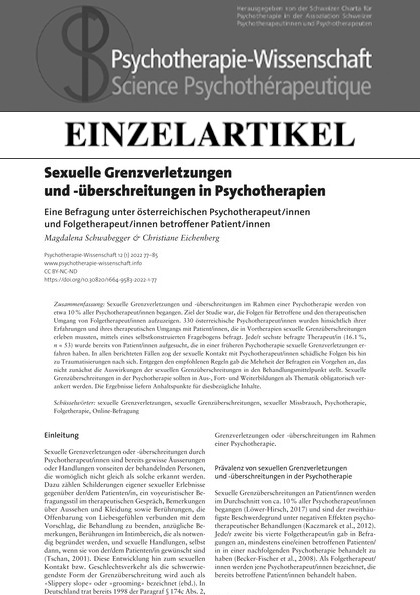Therapeutic border violations in psychotherapy
A survey among Austrian psychotherapists and follow-up therapists of affected patients
DOI:
https://doi.org/10.30820/1664-9583-2022-1-77Keywords:
Therapeutic border violations, sexual abuse, psychotherapy, follow-up therapy, online surveyAbstract
Approximately 10 % of all psychotherapists commit sexual violations and cross sexual boundaries in the context of psychotherapy. The aim of the study was to show the consequences of those affected and the therapeutic treatment of follow-up therapists. 330 Austrian psychotherapists were asked about their experiences and their therapeutic treatment of patients, who had experienced sexual transgressions in previous therapies by using a self-designed questionnaire. Every sixth therapist who was interviewed (16.1 %, n = 53) has already been consulted by patients who have experienced sexual violations. In all reported cases, the sexual contact with psychotherapists entailed harmful consequences up to traumatization. Contrary to the recommended rules, the majority of the respondents indicated a procedure that did not initially focus on the effects of violations of sexual transgressions in the context of psychotherapy. Crossing sexual boundaries in the context of psychotherapy should be made a compulsory subject of training and further education. The results provide indications for related contents.
Downloads
How to Cite
Schwabegger, M., & Eichenberg, C. (2022). Therapeutic border violations in psychotherapy: A survey among Austrian psychotherapists and follow-up therapists of affected patients. Psychotherapie-Wissenschaft, 12(1), 77–85. https://doi.org/10.30820/1664-9583-2022-1-77
Issue
Section
Original Work
License

This work is licensed under a Creative Commons Attribution-NonCommercial-NoDerivatives 3.0 Unported License.
This journal provides open access to its content in accordance with the basic premise that the free public availability of research benefits the exchange of knowledge throughout the world.
Authors wishing to publish in this journal agree to the following:
- The author/s retain/s the copyrights and consent/s to initial publication of the work in the journal under a Creative Commons Attribution licence, which allows third parties to use the work by citing the name/s of the author/s and this journal as initial publisher (in accordance with the Creative Commons Attribution-NonCommercial-NoDerivs 3.0 DE-Licence).
- The author/s can enter into additional contracts for the non-exclusive distribution (e.g. publish in a collection or book) of the version published in the journal, if the journal is cited as initial publisher.


